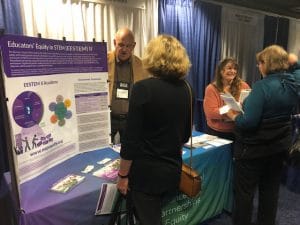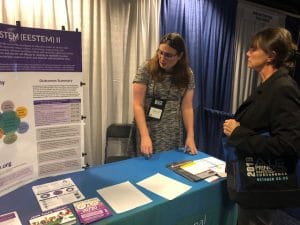

The American Association of Community Colleges, in support of the National Science Foundation (NSF) Advanced Technological Education (ATE) Program, held the 26th National ATE Principal Investigators Conference in Washington DC October 23-25, 2019. The conference included teams from NSF ATE-funded projects from throughout the country, which includes approximately 850 representatives of community colleges, business and industry, secondary school systems, 4-year colleges, and nonprofit organizations. The NAPE Education Foundation’s (NAPEEF) Educators’ Equity in STEM II Project, funded since the fall of 2016 was featured in an evening Showcase and a Conference Forum Session. Project team members included Ben Williams, PhD, PI and NAPE CEO, Gregory Jackson, NAPE Program Manager, Bob Mitchell, Co-PI Dona Ana Community College, Natalee Hilt, PhD, Co-PI Stark State College, and participant Kathy Albin, North Idaho College.
The NAPEEF Team shared that the Educators’ Equity STEM Academy (EE-STEM II; DUE 1601548) successfully developed an effective model to deliver high-quality professional growth nationally with fidelity for over 200 community college science, technology, engineering, and mathematics (STEM) technician education faculty and their secondary colleagues teaching college and secondary gateway courses. Teams from 15 community and technical colleges representing 11 states comprising 92 faculty in all participated in two cohorts of professional learning. These 92 faculty then reached out to and further educated over 340 of their peers at their institutions, far exceeding the goal of at least 100 others.
The outcomes from the project were powerful and exciting, in that the professional learning enhanced teaching skills and practices, and educator self-efficacy in creating an equitable learning environment. In addition, significant positive student outcomes for women and girls, students of color, and students with disabilities were observed, and the project met or exceeded all of it goals. Click on the following link for a more detailed report of the outcomes of this project.
The Forum Session highlighted the work of the North Idaho College (NIC) faculty, which participated in the second cohort of the academy from summer 2018 to summer 2019. NIC put together a team that focused on increasing the success and retention of women in nontraditional occupational pathways by using positive messaging and affirmation to build their self-efficacy. The team took its inspiration from NAPE Kudo’s cards, which they modified as Positivity Cards, with NIC colors, logo and custom quotes. Second, the action research team developed a three-question self-efficacy survey. And third, the core team that attended the EESTEM II summer institute in summer 2018 recruited additional faculty to share with them key issues and strategies around growth mindset, addressing implicit bias, micromessaging and building student self efficacy through positive messaging.
The results included discussion amongst a broader campus community, leading to more faculty members wanting to implement these approaches in their classrooms. Several faculty members shared that the simple idea of handwritten notes (Positivity Postcards) and the use of ‘WISE feedback’ was of great interest to them, as their Department Chairs were asking for more frequent communication with students. The survey stimulated further conversations around accessibility. Lastly, the broader trainings on NAPE resources stimulated further conversation on best practices and how to better promote equity. The goal moving forward is to continue with institutional outreach to staff and faculty. Additionally, the action research team will design an awareness activity to include in convocation. Click here for more information on the work of the North Idaho College team.
We are thankful to all of the dedicated STEM faculty who participated in this project, who are working to recognize and remove barriers to access and success for women and girls, students of color, and students with disabilities.